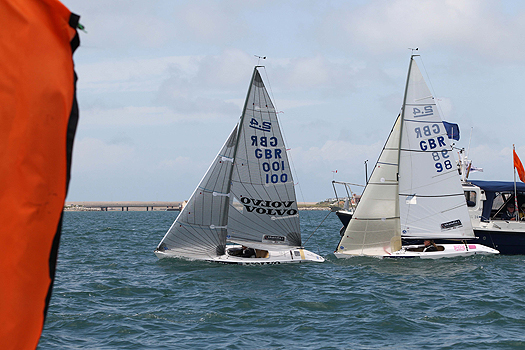Displaying items by tag: IFDS world championships
Irish Paralympic Team Making a Splash at IFDS Worlds
#PARALYMPICS - Irish team members John Twomey, Anthony Hegarty and Ian Costello are making waves at the World Championships for disabled sailors in Florida this week.
Inside World Parasport reports that the trio from Kinsale Yacht Club are tied for the top spot in the Sonar class, ahead of Norway and France, in the International Association for Disabled Sailing (IFDS) event at Laishey Park Marina.
As previously reported on Afloat.ie, Twomey and his crew have already qualified for the London Paralympics this summer after claiming one of the few rwmaining spots at the IFDS Worlds in Weymouth last July.
British Paralympic Hopeful Secures Bronze at the IFDS Worlds
The Weymouth and Portland National Sailing Academy (WPNSA) saw 46 entries in the 2.4 mR class, 21 Skud 18 entrants and 23 entries in the Sonar class. The week began with a test across all classes in painfully light airs causing the competitors to demonstrate not only intense concentration but world class skill in mastering the tricky breeze.
As the week progressed the wind increased providing a test of fitness, not dissimilar to the Skandia Sail for Gold regatta the month before. Having had a strong start to her regatta Paralympic sailor, Helena Lucas found herself defending her position by day three in some close racing with her national teammate close on her heels.

Southampton based Lucas said: "It was a really tricky day. In the first race, halfway up the first beat, it wasn't looking too flash and somehow I managed to scrape round in fourth. The only disappointing thing I think was that I was second or third at the bottom of the last run and went left, and then the wind went right and I lost three boats which was a bit of a shame. With the points so tight, those three or four points would have been rather handy today."
By day four, gusts over 20 knots provided the 155 sailors competing at the RYA-run event at the Academy this week with a completely different challenge to the first three days of racing. After day four, one title was decided as Brits Alex Rickham and Niki Birrell wrapped up their third straight SKUD crown on the penultimate day of the IFDS Worlds. Winds gusting up to 30 knots at the award-winning venue on the final day of racing meant that, despite the best efforts of the race management team, it was not deemed safe enough to send the sailors out racing so the decision was made to abandon proceedings around midday.

Paralympian Helena Lucas crossing the finish line ahead of British teammate Megan Pascoe. © Paul Smith - Yacht Pals International
With the overnight positions holding, Skandia Team GBR's Helena Lucas was delighted to win her third World Championship medal since 2006.
She said: "I had a great start to the regatta which was key, and I never dropped out of the top four. I think on the second day I was fourth but the points were so tight and I just managed to stay in the medal positions all the way through the week. If you look at the points it's just so close, so close. Going into today there were four or five people who stood a chance of getting bronze so there was certainly a real scrap for it. I knew what the forecast was yesterday and I knew it was key to try and make sure I finished yesterday in the medal places just in case we didn't race today."
Keir Gordon, Partner and Head of the Sports & Media Group at Charles Russell LLP, commented, "Not only did Helena finish on the podium which is brilliant but the five days of racing against the world's best would have provided Helena with the practice to help her in her run for a spot on the Skandia Team GBR."

























































